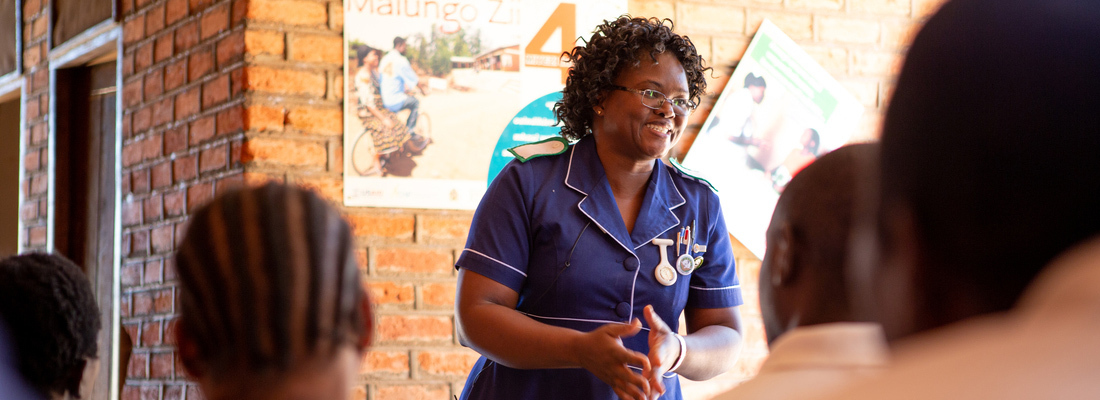
Training
The World Health Organization estimates the African continent will have a shortage of more than 6 million health care workers by 2030. Globally, shortages of nurses and midwives—who account for nearly 50 percent of the global health workforce—lead to maternal deaths, vastly understaffed health facilities, and other preventable health crises.
To bridge those gaps, build strong systems, and provide lifesaving care, PIH focuses on the training, education, and professional development of its health workers.
From an international university and an accredited teaching hospital to side-by-side mentorship and training, PIH is committed to strengthening local workforces and developing the next generation of global health care professionals, across all 11 countries where PIH works—and beyond.
Nurses and Midwives
Supporting nurses and midwives with the training and development they need to serve their patients and communities is integral to PIH’s work.
In Haiti, where PIH is known as Zanmi Lasante, much of that training takes place at the internationally accredited University Hospital in Mirebalais. Through the hospital’s Nursing Center of Excellence, we support nurses throughout the Haitian health system to formalize nursing practices, build the capacity of the health care workforce, and meet the region’s urgent need for specialized care.
In Malawi, we partner with the University of California – San Francisco in a mentoring program called Global Action to Improve Nurse Midwifery & Care, or GAIN. The program supports clinicians who are often the sole providers of maternal and child health care in vulnerable populations.
Additionally, our yearlong, PIH-wide fellowship program—the Global Nurse Executive Fellowship—has supported rising stars among PIH nurses since 2017. It seeks to fill a void of support for nurses in senior or executive leadership roles, who often are placed in their positions without being given the skills or support needed to be successful.
The program includes online instruction and webinars, monthly conference calls, and mentorship from veteran nursing leaders, while also requiring each fellow to complete an individual leadership project within the country where they work.
University Hospital
In collaboration with Haiti’s Ministry of Health in 2013, PIH opened University Hospital in Mirebalais, a 300-bed teaching hospital home to multiple residency programs, including: internal and family medicine, pediatrics, surgery, obstetrics and gynecology, neurology, nurse anesthetists, and emergency medicine.
University Hospital achieved a major milestone in January 2020, when ACGME-I, the international arm of the U.S.-based Accreditation Council for Graduate Medical Education, notified PIH of the hospital’s global accreditation as a teaching institution, after a multi-year process. The hospital team is next working toward programmatic accreditation, which will more specifically assess the hospital’s medical education curriculum, faculty, and programs.
Within this world-class teaching hospital, Zanmi Lasante has graduated more than 120 residents, the vast majority of whom have remained to work in Haiti, often at facilities supported by Zanmi Lasante.
University of Global Health Equity
Another growing hub of PIH’s training and education programs is the University of Global Health Equity (UGHE), a PIH initiative that was launched in 2015 in collaboration with Rwanda’s government and with catalytic funding from the Bill & Melinda Gates Foundation and the Cummings Foundation.
UGHE is dedicated to improving health care services and delivery for underserved populations around the world through curriculum and training that pairs a focus on human rights and social justice with rigorous, community-based medical education.
The university offers a one-year master’s in global health delivery degree and, in 2019, welcomed the first class in its six-and-a-half-year medical program, which combines the master’s degree with bachelor’s degrees in medicine and surgery, educating and training students who will be prepared to immediately work in clinical settings upon graduation.
UGHE also offers customized executive education certificate programs, designed to help health care professionals develop critical skills central to strengthening health care delivery systems.
PIH-supported Butaro District Hospital is just two miles away from UGHE’s campus and will serve as one of multiple teaching hospitals for university students. The hospital and its cancer center are supported by Inshuti Mu Buzima, as PIH is known in Rwanda.
UGHE’s impacts already have extended far beyond Rwanda. With students and alumni from more than 12 countries, the university is living up to its global name and vision.